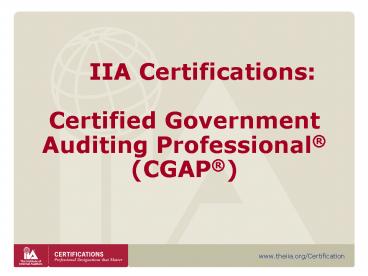IIA Certifications: Certified Government Auditing Professional CGAP - PowerPoint PPT Presentation
1 / 13
Title:
IIA Certifications: Certified Government Auditing Professional CGAP
Description:
Activity-based costing/cost-allocation (A) C. Implications of Various Service Delivery Methods ... Due process rights of clients/citizens (P) ... – PowerPoint PPT presentation
Number of Views:174
Avg rating:3.0/5.0
Title: IIA Certifications: Certified Government Auditing Professional CGAP
1
IIA CertificationsCertified Government
Auditing Professional (CGAP)
2
PURPOSE
- A specialty certification designed for and by
public-sector internal auditing practitioners - Designed especially for auditors working in the
public sector at all levels - federal/national,
state/provincial, local, quasi-governmental, or
crown authority. - Tests candidate's knowledge of the unique
features of public-sector internal auditing
fund accounting, grants, legislative oversight,
confidentiality rights, and more. - An excellent professional credential that
prepares and qualifies you for the many
challenges you face in this demanding public
sector arena.
3
EXAM DESIGN
- 125 multiple-choice questions
- Covers 4 domains
- Completion time 3.5 hours
- Standards tested on the CGAP exam
- The Institute of Internal Auditors (IIA)
Professional Practices Framework (Includes the
Code of Ethics, International Standards for the
Professional Practice of Internal Auditing,
Practice Advisories, and Development and Practice
Aids) - International Organization of Supreme Audit
Institutions (INTOSAI) Standards and Code of
Ethics
4
INTOSAI
- The International Organisation of Supreme Audit
Institutions (INTOSAI) operates as an umbrella
organisation for the external government audit
community - Provides an institutionalised framework for
supreme audit institutions to - promote development and transfer of knowledge
- improve government auditing worldwide
- enhance professional capacities, standing and
influence of member SAIs in their respective
countries
5
CGAP EXAM CONTENT
- 4 domains
- Domain I Standards, Governance, and Risk/Control
Frameworks (10-20) - Domain II Government Auditing Practice (35-45)
- Domain III Government Auditing Skills and
Techniques (20-25) - Domain IV Government Auditing Environment
(20-25)
6
Domain I Standards, Governance, and Risk/Control
Frameworks
- A. Standards
- Role of a comprehensive set of auditing/evaluation
standards (A) - Application of appropriate standards in all
assignments (P) - Role and impact of other auditing standards
(standards of public accounting bodies, quality
assurance bodies, etc.) and their relationship
with the above standards (A) - B. Governance
- Governance in the public sector (e.g., audit
committee, code of conduct, open government,
public scrutiny, equity, accountability) (P) - Role of audit within the governance structure (P)
- C. Risk/Control Frameworks (e.g., COSO, CoCo)
- Role of frameworks (A)
- Elements of a risk/control framework (P)
- Application of frameworks (P)
- D. IIA Code of Ethics (P)
P Proficiency A - Awareness
7
Domain II Government Auditing Practice
- A. Management of the Audit Function
- Need for a formal document of purpose, authority,
and responsibility (P) - Policies and procedures (A)
- Quality assurance (A)
- Planning (A)
- Staffing (A)
- Marketing the audit function (A)
- Mission/role/outcome of audit function within
government (A)
- B. Types of Audit Services
- Audits of compliance (P)
- Audits of performance/value-for-money/operations
(e.g., economy, efficiency, effectiveness) (P) - Audits of financial statements (A)
- Audits of financial systems (P)
- Audits of information and related technology (P)
- Consulting/assistance services (e.g., non-audit
advisory services) (A) - Integrity services (e.g., Fraud, Waste, and
Abuse) (P)
8
Domain II Government Auditing Practice (cond)
- C. Processes for Delivery of Audit Services
- Management of individual projects (P)
- Planning (The role of laws, regulations, rules,
and ordinances in your planning process should be
considered in the planning process) (P) - Risk and control assessment practices (P)
- Performing the engagement (P)
- Communicating results (P)
- Monitoring results (follow-up) (P)
9
Domain III Government Auditing Skills and
Techniques
- A. Management Concepts and Techniques (A)
- B. Performance Measurement (P)
- C. Program Evaluation (A)
- D. Quantitative Methods (e.g., statistical
methods and analytical review) (P) - E. Qualitative Methods (e.g., questionnaires,
interviews, and flow charts) (P) - F. Methods for the Identification and
Investigation of Integrity Violations (P) - G. Research/Data Collection Techniques (P)
- H. Analytical Skills (e.g., distinguish between
significant and insignificant information) (P)
10
Domain IV Government Auditing Environment
- A. Performance Management (P)
- B. Financial Management
- Unique requirements in accounting for and
reporting on government financial operations (P) - Principles of taxation and revenue generation (P)
- Unique aspects of governmental budgeting (e.g.,
encumbrances, earmarking) (P) - Government accounting (e.g., fund accounting,
resource accounting) (P) - Legal restrictions on sources and uses of funds
(e.g., voted funds, conditional grants, revenues)
(A) - Investment restrictions for public funds (A)
- Activity-based costing/cost-allocation (A)
- C. Implications of Various Service Delivery
Methods - Direct delivery by government employees (P)
- Grants Contracts (P)
- Joint Ventures/Partnerships/Authorities/Special
Operating Agencies/Quasi-governmental (A) - Privatization (A)
11
Domain IV Government Auditing Environment
- D. Implications of Delivering Services to
Citizens - Due process rights of clients/citizens (P)
- Confidentiality/privacy/rights of
clients/citizens (P) - Issues arising from the methods of
funding/delivering services (condition that
client receiving service may not be party paying
for the services ability-to-pay principle user
pay eligibility requirements limitations on
services available entitlements etc.) (A) - Reality of conflicting missions (e.g., satisfy
both developers and environmentalists, keep
families together and kids safe) (A) - Issues associated with at-risk populations (e.g.,
multiple, interacting causes and conditions
difficulty of measuring prevention) (A) - E. Unique Characteristics of Human Resources
Management (A) - F. Unique Purchasing and Procurement
Requirements (P)
12
PREPARING FOR AN EXAM
- http//www.theiia.org/certification/specialty-cert
ifications/cgap/ - Certified Government Auditing Professional
(CGAP) Examination Study Guide Third Edition or
CD (available in IIA Bookstore)
13
- Questions?
For additional information, please refer to the
Certification Candidate Handbook.































